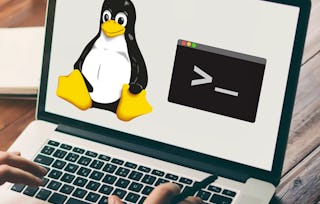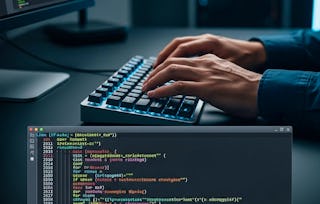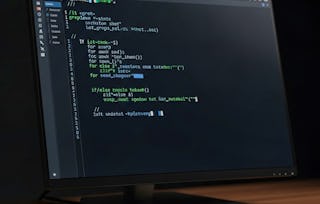Master Linux Commands & Shell Scripting with this comprehensive Linux course that bridges theory with practical application, equipping you with essential command-line proficiency and powerful shell scripting capabilities crucial for modern system administration.

Gain next-level skills with Coursera Plus for $199 (regularly $399). Save now.

Recommended experience
What you'll learn
Master Linux components, bootup processes, and essential command-line operations for system management.
Navigate and manipulate Linux file systems, directories, inodes, and implement effective file handling strategies.
Develop powerful BASH scripts using variables, control structures, loops, and decision-making constructs for task automation.
Apply advanced Linux commands for system administration, I/O redirection, and network operations.
Skills you'll gain
Details to know

Add to your LinkedIn profile
August 2025
99 assignments
See how employees at top companies are mastering in-demand skills

There are 10 modules in this course
Master core components of Linux operating systems and essential command-line tools for everyday operations.
What's included
16 videos5 readings11 assignments2 ungraded labs
Navigate the Linux file hierarchy and perform essential file management operations.
What's included
11 videos3 readings11 assignments1 ungraded lab
Understand filesystem architecture, superblocks, inodes, and links for effective data management.
What's included
9 videos3 readings9 assignments1 ungraded lab
Learn how Linux interacts with hardware through kernel I/O structures and device management commands.
What's included
10 videos3 readings10 assignments2 ungraded labs
Develop proficiency in the powerful vi text editor for efficient file creation and modification.
What's included
7 videos2 readings7 assignments1 ungraded lab
Master file recovery techniques and input/output redirection for advanced system operations.
What's included
15 videos3 readings15 assignments
Create basic shell scripts with variables, interactive input, and arithmetic operations.
What's included
9 videos4 readings10 assignments1 ungraded lab
Implement conditional logic, loops, and file operations in your scripts.
What's included
11 videos6 readings12 assignments1 ungraded lab
Understand operating system modes and process creation through system calls.
What's included
8 videos3 readings9 assignments1 ungraded lab
Apply low-level file operations and advanced administrative commands.
What's included
4 videos3 readings5 assignments2 ungraded labs
Instructor

Explore more from Software Development
 Status: Free Trial
Status: Free Trial Status: Free Trial
Status: Free Trial Status: Free Trial
Status: Free Trial
Why people choose Coursera for their career




Frequently asked questions
This course provides comprehensive training in Linux commands and shell scripting, essential skills for modern IT professionals. As organizations increasingly adopt Linux for its stability, security, and versatility, proficiency in these skills has become crucial for system administration, cloud computing, DevOps, and many other IT roles.
This course is designed for IT professionals, system administrators, developers, DevOps engineers, and students who want to gain practical Linux skills. It's ideal for both beginners looking to establish a solid foundation and intermediate users wanting to enhance their command-line and scripting capabilities.
Upon completion, you'll be able to navigate Linux systems confidently, manage files and processes efficiently, create powerful shell scripts for automation, implement decision-making logic in your scripts, and apply system administration commands to manage Linux environments effectively.
More questions
Financial aid available,






